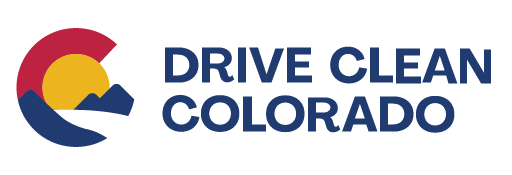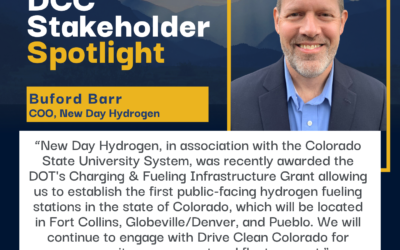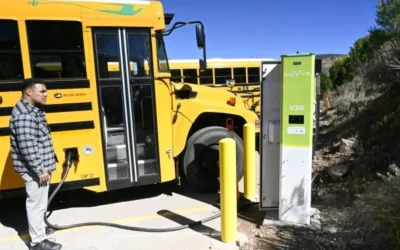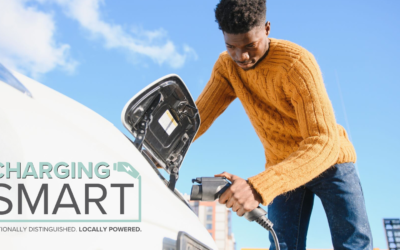We are quite excited to have the Office of Climate Action, Sustainability & Resiliency (CASR) as one of our members at Denver Metro Clean Cities. CASR works in collaboration with many other organizations, departments and units of government to enable a sustainable, resilient, climate-safe future for all of Denver. One of their initiatives involves creating sustainable transportation and mobility in Denver through the adoption of electric vehicles in order to reduce the greenhouse gas emissions produced by the transportation sector. Mike Salisbury, the Transportation Energy Lead for CASR, spoke with us about his work and CASR’s current climate goals. Keep reading to hear about CASR’s partnership with Colorado CarShare, their involvement with Denver Metro Clean Cities and what they’re looking forward to in 2021.
Organization: Office of Climate Action, Sustainability & Resiliency 
Location: Denver, CO
*Note: The following answers have been summarized from an interview with Mike Salisbury from CASR
Can you tell us a little bit about yourself and your role at CASR?
My official title is Transportation Energy Lead in the Office of Climate Action, Sustainability & Resiliency. I lead the City of Denver’s work on electric vehicles and all things electrified mobility and try to get as many vehicles on the road to be electric as possible. There are a lot of programs and different projects we do to help progress electrified mobility. Some of these involve putting in more charging stations owned by the city, aligning city policies to make it easier for the private sector to put in stations and general education and outreach to the community. We are also working on electrifying the city’s own fleet to demonstrate that the city is a leader in electrification and be a role model to the rest of Colorado.
What does a typical day for you look like?
There are several different projects and programs I’m involved with, so a lot of my day is having a list of things I need to focus on to advance all these projects and programs forward step-by-step. I also get a lot of emails every day from people internally (from the city) and externally who have things they need – much of this involves answering questions about EVs, fixing problems with charging stations and scheduling meetings with our stakeholders. The work is all over the place, but the main goal is trying to move slowly toward implementing our programs and building out good ideas to execute new EV-focused programs in the city.
You recently announced an electric carshare program you are doing with Colorado CarShare, can you tell us about that?
This program was actually started a few years ago. We had worked with Colorado CarShare in 2019 to do an initial pilot project of one their electric carshare vehicles in the Mariposa neighborhood in Denver. We were very pleased with how that vehicle was being used and how the project turned out, so we discussed with Colorado CarShare how we could scale up this work. Since the carshare and charging stations are capital-intensive expenditures and they require some funding support, we were looking into different funding opportunities to help us move forward – one of these was the Federal Cares Act. As a result of the Federal Cares Act there was funding flowing down to local governments, so the City of Denver developed proposals to support many different projects that were tied to the city’s response to Covid. We saw this as a great opportunity to move forward with the carshare project so my office and Colorado CarShare co-applied for this grant, leveraging the public’s reaction to Covid and how people were hesitant to use public transportation (buses, trains, shuttle services like Uber and Lyft) – the carshare program model we proposed avoids this issue by having just one person in the car at a time. We were also looking for a way to make these new vehicles as low-emitting and clean as possible, so we developed the program with EVs in mind. The great part about this program is that it offers people another mobility option, especially those in under resourced neighborhoods who already lack available transportation and might benefit from having a car they can use to get around.
We ended up getting the grant funding, which is very exciting, and are moving forward with the project. A chunk of the grant goes to Colorado CarShare to help them buy the electric vehicles and our role is to use the rest of the funding to get the charging stations in the ground and operational. We find locations ideal for setting up a carshare and look for the most efficient places to put in new charging stations. Once we determine a viable site, we support the site-host (the city, Denver housing authority building, etc.) to get the stations installed and up-and-running. The final component to this project is outreach and discounts – we are working with Colorado CarShare to provide additional discounts to income-qualified residents so that they have more access to the program. To support this, we do outreach to different communities to let them know that this program exists and how they can take advantage of the discounts.

As a stakeholder for DMCC, how has the carshare project and your partnership with DMCC helped you achieve your sustainability goals? What are you looking forward to partnering on in the future?
With regards to DMCC, one of the things I value the most about your work is the Drive Electric Colorado website. Having such a robust resource available that is local is extremely beneficial – I often refer people who have questions about EVs to that site as a resource recommendation. The Drive Electric Coaching program you offer is also fantastic. I do my best to answer people’s questions about EVs, but I often refer people to the Coaches, since helping people understand EVs and switch to electric is what they do best. One of the main benefits of having a local Colorado resource is that they understand how all the local grants and funding work – they can support people wanting to apply for local grants and guide them through the whole process.
Due to Covid, many plans for EV events, specifically Ride & Drives, fell through. Despite this, DMCC adapted to the new norm and got people involved in webinars and online meetings to keep the education and outreach going. For the future, I hope we can get to a place in the world where we can do those in-person events again and physically put people behind the wheel of an EV. The online outreach is necessary right now, and it’s a great resource, but getting behind the wheel of an EV is an irreplaceable experience that will always have more of an impact.
What is one thing you are most excited for in 2021?
For my office specifically, we are lucky because in November, the Denver voters approved the Climate Protection Fund, a dedicated revenue source to support climate work in the city of Denver that is managed and run by my office. This fund provides an amazing opportunity for us to go out and do the climate focused work that we excel at because it gives us more resources. With this funding, we are in the process of setting up advisory committees and making sure we are engaging with the community and getting stakeholders involved – the goal is to develop ideas and programs we want to launch in 2021. This is certainly taking up a lot of our bandwidth right now, but it’s really exciting to be given the opportunity to do a lot of great work to start new programs or expand existing programs regarding the climate. We are also focused on equity and figuring out how we pair our climate-focused work with projects that support under resourced communities in Denver – we want to bring racial economic justice to all of Denver’s residents.
Is there anything we haven’t touched on that you want to talk about?
I think it’s a very exciting time to be involved in electrified transportation and EVs. We are working very closely with the state and with the new federal administration and there’s going to be a lot of great stuff happening across the country with EVs. Between that and the city’s Climate Protection Fund, I think there will be lots of awesome stuff happening in Colorado as well. Excel’s Transportation Electrification Plan is also about to go into effect, providing even more room for growth in clean transportation. I am eager to see what we and everyone else are doing in 2021 and moving forward.
See more DMCC Member Spotlights or learn more about joining DMCC today!






